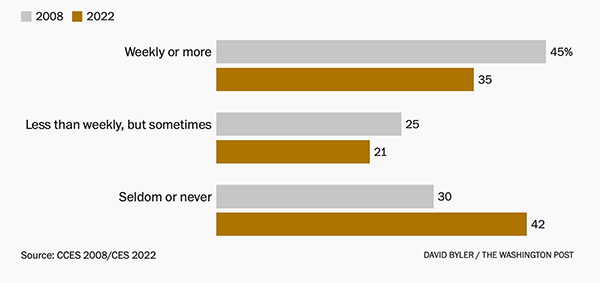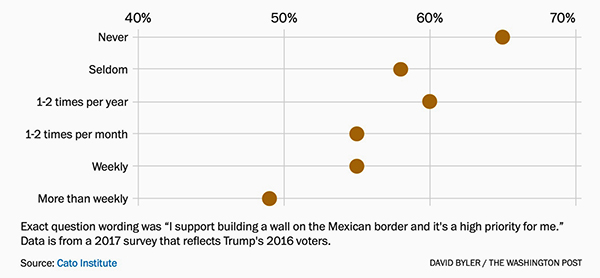

The Washington Post doesn't have its own Nate so it uses a David (Byler) to handle stories involving statistics, like this one about the role of religion in the Republican Party. It was once the case that evangelicals were the dog and the Republican Party was the tail it wagged. That's apparently not true any more. Here is a chart showing church attendance for Republicans in 2008 and in 2022:

As you can see, in 2008, 43% of Republicans attended church every week and only 30% seldom or never did. By 2022, only 35% attended church every week and 42% seldom or never did. So now the "seldom or never" group is the largest chunk of the Republican base.
This change in the Republican electorate is what powered Donald Trump in 2016 and still does. A deeply religious party would never countenance a twice-divorced candidate who is a serial sinner and proud of it. On policy issues, it's clear that the "nevers" and "seldoms" are the key people supporting Trump. For example, here is the percentage of Trump voters who want to build a wall on the Mexican border, by religious practice.

There is an almost linear relationship here. The less often you go to church, the more you want to build a wall on the Mexican border. The evangelicals are clearly not running the show here. Trump is actually appealing to people who are not religious more than he is appealing to people who are. On issues like: "Does the economy favor the rich?" the "nevers" and "seldoms" agreed far more with the statement than the weekly churchgoers. To some extent, this explains why Trump is doing so well with Republicans, despite his manifest lack of interest in religion: Republicans also are not so interested in religion anymore.
On a few issues, the churchgoers pushed Trump to the right. The most notable is abortion. Before becoming a candidate, Trump was pro-choice. After becoming a candidate, he became anti-abortion. It is one of the few issues where churchgoers and evangelicals are having a big influence on Trump's positions, although it was enough to get the Jesus Republicans on board with The Donald, despite his obvious irreligiosity. The lesson for Republican politicians who want to be president, at least in 2024 and 2028, is clear: Through the evangelicals a bone or two, and that's all it takes. Truth is, Ronald Reagan used the same basic strategy 40 years ago.
That said, strict abortion bans are not popular outside the most zealous parts of the Republican Party, which is why the GOP did so badly in 2022. As non-churchgoers become an even larger fraction of the Republican base, the GOP is going to have to change and reject what evangelicals want more and more, or become politically obsolete. (V)